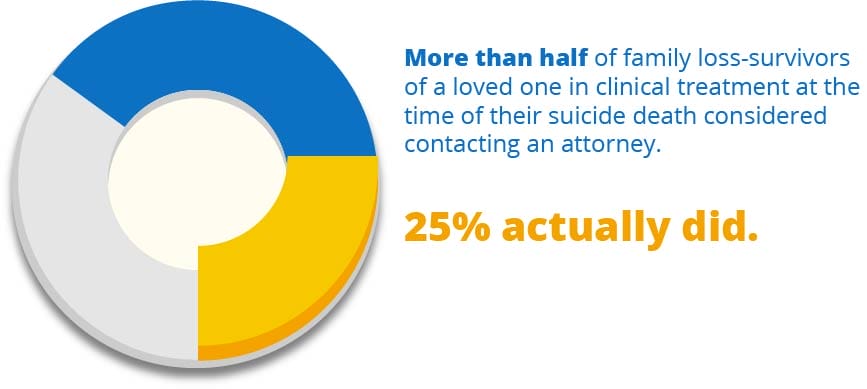
Suicide Malpractice Lawsuits
Mental health providers who work with suicidal patients are particularly vulnerable to suicide malpractice lawsuits and related liability issues.
Studies have revealed that over 50% of families of patients who died by suicide consider the fatal outcome to be a clear-cut case of malpractice. Shockingly, 25% of these families even consult with a lawyer regarding filing a malpractice lawsuit. As such, mental health professionals must be diligent in providing appropriate care, documenting thoroughly, and taking steps to mitigate suicide risk to avoid liability and potential lawsuits.
Why Do Patients and Families Consider Suing for Suicide Malpractice
Patients and families often consider suing for suicide malpractice due to the devastating consequences of a loved one’s suicide. Many families believe that the suicide could have been prevented if the mental health provider had taken appropriate measures, such as adequately assessing and documenting suicide risk, providing adequate treatment, and monitoring for warning signs. Failure to take such measures can be seen as a breach of duty, and families may view it as negligence on the part of the mental health care provider.
Additionally, families may consider suing for suicide malpractice because they feel that it is the only way to hold mental health care providers accountable for their actions or lack thereof. In many cases, families are seeking answers and justice for their loved one’s death. While no amount of compensation can fully make up for the loss of a loved one, a successful malpractice lawsuit can provide families with some measure of closure and financial support.
Reducing Suicide Risk and Malpractice
To mitigate the risk of suicide malpractice lawsuits and related liability issues, mental health care providers must prioritize delivering competent care throughout all clinical settings. By providing personalized and compassionate suicide prevention therapy that is tailored to each patient’s unique needs, mental health professionals can help mitigate suicide risk and improve outcomes for their patients.
At CAMS-care, we offer a well-established suicide-specific intervention that has been developed based on over 30 years of clinical research and global usage. Our evidence-based approach enables mental health providers to assess and mitigate suicide risk factors while enhancing patient care. By utilizing our proven intervention, providers can reduce the risk of malpractice lawsuits while improving outcomes for suicidal patients.
